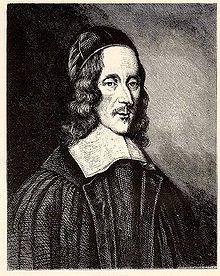Poem & Analysis of 'The Windows' by George Herbert
POEM
The Windows
George Herbert (3 April 1593 – 1 March 1633)
Lord, how can man preach thy eternal word?
He is a brittle crazy glass;
Yet in thy temple thou dost him afford
This glorious and transcendent place,
To be a window, through thy grace.
But when thou dost anneal in glass thy story,
Making thy life to shine within
The holy preachers, then the light and glory
More reverend grows, and more doth win;
Which else shows waterish, bleak, and thin.
Doctrine and life, colors and light, in one
When they combine and mingle, bring
A strong regard and awe; but speech alone
Doth vanish like a flaring thing,
And in the ear, not conscience, ring.
ANALYSIS
The Soul and the Window in Herbert’s The Windows
The poem The Windows was written by George Herbert(1593-1633).Herbert was an important metaphysical poet of 17th century. The present poem is a metaphysical poem with an innovative metaphoric representation.
In the beginning the poet asks God, how man can preach the sacred preachings of God? As man is imperfect and impure, how man can use God’s eternal word? The poet says despite his imperfection, God has allowed him to be in the holy temple (church) as a window. Further, the poet describes about the grace of God. He says by his grace, he is in the holy place of god. When the story of god is inscribed on the glasses of the windows, the window shines. In other words, the poet’s life shines when the story of god is inscribed in his soul. By the light, glory, preachings of god an ordinary window turns out to be extraordinary. The ordinary glasses are waterish, bleak, thin and full of dust. But by the grace of god, the window becomes sacred and reverential. The poet suggests that because of god’s grace and his preachings, he becomes sacred.
Then the poet indicates his intense desire to mingle with god. His union with the god is similar to the combination of colours and light on the window. The poet indicates that, doctrine and life, preaching and practice should mingle with each other in his life inseparably. This is also an indication of poet’s total union with the god. The poet suggests that the words of god should become a part of his conscience.
George Herbert develops a hyperbolic comparison between his soul and the windows of the church. Herbert ingeniously shows how an ordinary window becomes extraordinary and reverential by the grace of god. As a priest, Herbert seriously contemplated about the relationship between god and man. The poem is an indication of his inner struggle and contemplation.
Here, we can see a typical metaphysical conceit, where two dissimilar things like windows and soul are compared to each other. However at the end, we can notice that Herbert tries to develop a harmonious relationship with god. He wants his soul to become sacred by the preachings of god. The poem shows the inner religious struggle raging in his mind. He conveys his feelings towards god being both as an ordinary man and also as a priest.
Amrutha G.T.
2nd Yr. B.A (PJE)
Sahyadri Arts College
Shivamogga




Thanks a lot Amrutha GT for highlighting how Herbert conveys his inner message for the communion with God by bringing out the metaphysical conceits.
ReplyDelete